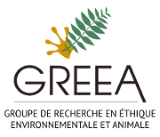M. Vellend, “Do the values of biodiversity scientists bias biodiversity science?” | Recording online
The recording of the talk of Mark Vellend (Université de Sherbrooke), “Do the values of biodiversity scientists bias biodiversity science?”, is now available online:
- Youtube (with subtitles): https://www.youtube.com/watch?v=XE8AB8mN5aU
- PeerTube: https://tube.tchncs.de/w/7P3Gi3QBRRMjPvKHb3116z
- Soundcloud: https://soundcloud.com/greea/mark-vellend-2022
Abstract
Values have a profound influence on the behaviour of all people, scientists included. Biodiversity is studied by ecologists (the author included), most of whom align with the “mission-driven” field of conservation biology. The mission involves the protection of biodiversity, and a set of contextual values including the beliefs that biological diversity and ecological complexity are good and have intrinsic value. This raises concerns that the scientific process might be influenced by biases that promote outcomes aligning with contextual values. Retrospectively, I have identified such biases in my own work, deriving from an implicit assumption that organisms that are not dependent on natural habitats such as forests effectively do not count in biodiversity surveys. Finding that anthropogenic forest disturbance reduces the diversity of plant species dependent on shady forests can thus be falsely equated with more general biodiversity loss, when in fact disturbance might increase overall plant diversity (i.e., including all of the species found growing in a particular place). Here I ask whether ecologists share values that are unrepresentative of broader society, I discuss examples of potential value-driven biases in biodiversity science, and I present some hypotheses from behavioral economics on possible psychological underpinnings of shared values and preferences among ecologists.

 Previous Post
Previous Post Next Post
Next Post